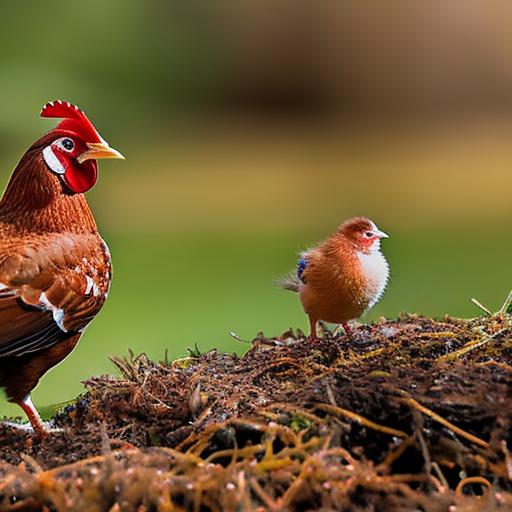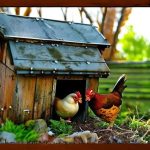Raising chickens on rented land can be a rewarding and sustainable endeavor. Not only do chickens provide fresh eggs, but they also help control pests and provide natural fertilizer for gardens. However, it is important to understand the basics of chicken care and management to ensure the health and well-being of your flock.
One of the benefits of raising chickens on rented land is the ability to have a sustainable food source. Fresh eggs are a nutritious and delicious addition to any diet, and having your own flock allows you to have a constant supply. Additionally, chickens can help control pests in your garden by eating insects and other small creatures. They also produce high-quality fertilizer that can be used to nourish your plants.
Proper care and management are essential when raising chickens on rented land. This includes providing them with a safe and comfortable living environment, meeting their nutritional needs, and ensuring their health and hygiene. By understanding these basics, you can create a thriving flock that will provide you with fresh eggs and contribute to a sustainable lifestyle.
Key Takeaways
- Raising chickens on rented land requires legal considerations and landlord approval.
- Providing safe and comfortable housing is crucial for your chickens’ well-being.
- Meeting the nutritional needs of your flock through proper feeding and watering is essential.
- Preventing and treating common chicken illnesses is important for maintaining their health and hygiene.
- Protecting your chickens from predators and pests and minimizing noise and odor disturbances for your neighbors are also important factors to consider.
Legal Considerations: Checking Local Laws and Regulations
Before starting your chicken-raising journey on rented land, it is important to research the local laws and regulations regarding chicken ownership. Different areas may have specific rules regarding the number of chickens allowed, coop requirements, and noise restrictions. By familiarizing yourself with these regulations, you can ensure that you are in compliance with the law.
In addition to researching local laws, it may be necessary to obtain permits or licenses to keep chickens on your rented property. Some areas require specific permits for keeping livestock or poultry, while others may have zoning restrictions that need to be considered. It is important to check with your local government or agricultural extension office to determine what permits or licenses are required in your area.
By taking the time to understand and comply with local laws and regulations, you can avoid potential legal issues and ensure that your chicken-raising venture is a success.
Landlord Approval: Getting Permission to Keep Chickens on Your Rented Property
Once you have familiarized yourself with the legal considerations, it is important to communicate with your landlord about your plans to keep chickens on the rented property. It is essential to get their approval before proceeding, as they may have specific rules or concerns that need to be addressed.
When approaching your landlord, it is important to be prepared and knowledgeable about the benefits of raising chickens and how you plan to care for them. Provide information about the benefits of having fresh eggs and how chickens can help control pests in the garden. Assure your landlord that you will take responsibility for the care and management of the chickens and address any concerns they may have.
It is also important to be open to compromise and willing to work with your landlord to find a solution that works for both parties. They may have specific requirements or restrictions that need to be met, such as the type of coop or run that is allowed. By being flexible and willing to accommodate their concerns, you can increase the chances of getting their approval.
Housing Requirements: Providing Safe and Comfortable Living Quarters for Your Chickens
One of the most important aspects of raising chickens on rented land is providing them with a safe and comfortable living environment. This includes choosing the right coop and run for your flock, as well as ensuring proper ventilation, lighting, and insulation.
When selecting a coop, it is important to consider the size and number of chickens you plan to keep. The coop should provide enough space for each chicken to move around comfortably and have access to nesting boxes for laying eggs. It should also be secure and predator-proof, with sturdy walls and a secure door.
The run is an outdoor area where the chickens can roam and scratch for food. It should be spacious enough for the chickens to move around and have access to fresh air and sunlight. It should also be enclosed with a fence or wire mesh to protect the chickens from predators.
Proper ventilation is essential to prevent the buildup of moisture and ammonia in the coop, which can lead to respiratory problems for the chickens. This can be achieved by providing windows or vents that can be opened and closed as needed.
Lighting is also important for the health and well-being of your flock. Chickens require a certain amount of light each day to maintain their natural circadian rhythm and lay eggs. This can be achieved by providing natural light through windows or using artificial lighting in the coop.
Insulation is important for maintaining a comfortable temperature inside the coop, especially during extreme weather conditions. This can be achieved by using insulation materials such as straw or foam panels on the walls and roof of the coop.
By providing a safe and comfortable living environment for your chickens, you can ensure their health and well-being and increase the chances of a successful chicken-raising venture.
Feeding and Watering: Meeting the Nutritional Needs of Your Flock
Proper nutrition is essential for the health and productivity of your flock. Chickens require a balanced diet that includes a combination of commercial feed, supplements, and access to fresh water at all times.
Commercial chicken feed is formulated to provide all the necessary nutrients that chickens need to thrive. It is important to choose a feed that is appropriate for the age and type of chickens you are raising. For example, chicks require a different type of feed than adult chickens, and laying hens require feed that is high in calcium to support egg production.
In addition to commercial feed, it is important to provide your flock with supplements to ensure they are getting all the necessary vitamins and minerals. This can include offering crushed oyster shells or calcium supplements to support eggshell production, as well as providing grit to help with digestion.
Access to clean water is also essential for the health and well-being of your flock. Chickens require fresh water at all times to stay hydrated and maintain their body temperature. It is important to regularly clean and refill their water containers to prevent the buildup of bacteria or algae.
By meeting the nutritional needs of your flock, you can ensure their health and productivity and enjoy the benefits of fresh eggs.
Health and Hygiene: Preventing and Treating Common Chicken Illnesses

Maintaining a clean and sanitary living environment is essential for preventing and treating common chicken illnesses. Chickens are susceptible to a variety of diseases and parasites, so it is important to implement proper hygiene practices to keep them healthy.
Regularly cleaning the coop and run is essential for preventing the buildup of bacteria or parasites. This includes removing soiled bedding, cleaning nesting boxes, and disinfecting surfaces. It is also important to regularly check for signs of pests such as mites or lice and take appropriate measures to treat them.
In addition to maintaining a clean living environment, it is important to monitor your flock for signs of illness or injury. Common signs of illness in chickens include lethargy, loss of appetite, changes in behavior, or abnormal droppings. If you notice any of these signs, it is important to consult a veterinarian who specializes in poultry health.
Preventive measures such as vaccinations can also help protect your flock from common diseases. Consult with a veterinarian to determine which vaccinations are recommended for your area and type of chickens.
By implementing proper hygiene practices and monitoring the health of your flock, you can prevent and treat common chicken illnesses and ensure the well-being of your chickens.
Predators and Pests: Protecting Your Chickens from Harmful Wildlife and Insects
Predators and pests can pose a threat to the safety and well-being of your flock. It is important to identify potential predators in your area and implement measures to deter and protect against them.
Common predators that may pose a threat to chickens include raccoons, foxes, coyotes, and birds of prey. It is important to secure the coop and run with sturdy fencing or wire mesh to prevent predators from gaining access. Additionally, it is important to close and lock the coop at night to keep the chickens safe from nocturnal predators.
In addition to predators, chickens can also be susceptible to pests such as mites, lice, and fleas. Regularly inspecting your flock for signs of pests and taking appropriate measures to treat them is essential for their health and well-being. This can include using natural remedies such as diatomaceous earth or consulting with a veterinarian for appropriate treatments.
By implementing measures to deter and protect against predators and pests, you can ensure the safety and well-being of your flock.
Noise and Odor Control: Minimizing Disturbances for Your Neighbors
When raising chickens on rented land, it is important to be considerate of your neighbors’ concerns regarding noise and odor. Chickens can be noisy at times, especially when they are laying eggs or if there is a rooster in the flock. Additionally, chicken manure can produce odors that may be unpleasant for nearby neighbors.
To minimize noise disturbances, it is important to choose chicken breeds that are known for being quieter. Additionally, providing a comfortable and stress-free living environment for your flock can help reduce noise levels. This includes ensuring they have enough space in the coop and run, as well as providing enrichment activities such as perches or toys.
To control odors, it is important to regularly clean the coop and run to prevent the buildup of manure. Composting the manure can also help reduce odors and provide a valuable source of fertilizer for your garden. Additionally, planting fragrant herbs or flowers near the coop can help mask any lingering odors.
By taking steps to reduce noise and odor levels, you can maintain a positive relationship with your neighbors and ensure a harmonious living environment.
Egg Production: Maximizing Your Flock’s Laying Potential
Maximizing egg production is a goal for many chicken owners. There are several factors that can affect egg production, including breed, age, nutrition, lighting, and stress levels.
Choosing the right breed of chickens is important for maximizing egg production. Some breeds are known for being prolific layers, while others may lay fewer eggs. It is important to research different breeds and choose ones that are known for their egg-laying abilities.
The age of the chickens also plays a role in egg production. Most hens start laying eggs around 5-6 months of age and will continue to lay for several years. However, egg production may decrease as the hens get older.
Proper nutrition is essential for maximizing egg production. Providing a balanced diet that includes commercial feed, supplements, and access to fresh water at all times is important. Additionally, providing calcium supplements such as crushed oyster shells can help support eggshell production.
Lighting also plays a role in egg production. Chickens require a certain amount of light each day to maintain their natural circadian rhythm and lay eggs. Providing artificial lighting in the coop during the winter months can help stimulate egg production.
Stress can also affect egg production. It is important to provide a comfortable and stress-free living environment for your flock. This includes ensuring they have enough space in the coop and run, as well as providing enrichment activities such as perches or toys.
By understanding the factors that affect egg production and implementing strategies to maximize it, you can enjoy a bountiful supply of fresh eggs from your flock.
Enjoying the Benefits of Raising Chickens on Rented Land
Raising chickens on rented land can be a rewarding and sustainable endeavor. Not only do chickens provide fresh eggs, but they also help control pests and provide natural fertilizer for gardens. However, it is important to understand the basics of chicken care and management to ensure the health and well-being of your flock.
By checking local laws and regulations, obtaining landlord approval, providing a safe and comfortable living environment, meeting the nutritional needs of your flock, maintaining their health and hygiene, protecting them from predators and pests, minimizing noise and odor disturbances, maximizing egg production, and being a responsible chicken owner, you can enjoy the benefits of raising chickens on rented land.
Fresh eggs are a nutritious and delicious addition to any diet, and having your own flock allows you to have a constant supply. Additionally, chickens can help control pests in your garden by eating insects and other small creatures. They also produce high-quality fertilizer that can be used to nourish your plants.
By following these guidelines and being a responsible chicken owner, you can enjoy the benefits of raising chickens on rented land while maintaining a positive relationship with your neighbors and ensuring the health and well-being of your flock.
If you’re considering keeping chickens on rented land, you may be wondering about the logistics and requirements. Luckily, there are resources available to help you navigate this process. One helpful article to check out is “Chicken Coop Run Plans” from Poultry Wizard. This article provides detailed plans and instructions for building a chicken coop and run, which can be essential for keeping your chickens safe and secure. Whether you’re starting from scratch or repurposing an existing structure, another informative article worth exploring is “Turning a Shed into a Chicken Coop.” Additionally, if you’re located in the Muskegon area, “Chicken Coop Muskegon” offers specific insights and tips for keeping chickens in that region. These articles provide valuable guidance for anyone looking to keep chickens on rented land.
FAQs
Can you keep chickens on rented land?
Yes, you can keep chickens on rented land, but you need to check with your landlord first. Some landlords may have restrictions on keeping livestock on their property.
What are the benefits of keeping chickens on rented land?
Keeping chickens on rented land can provide you with fresh eggs, meat, and fertilizer for your garden. It can also be a fun and educational experience for children and adults alike.
What are the requirements for keeping chickens on rented land?
The requirements for keeping chickens on rented land may vary depending on your location. You may need to obtain a permit or license, follow zoning regulations, and provide adequate housing and care for your chickens.
What kind of housing do chickens need?
Chickens need a secure and dry coop to protect them from predators and the elements. The coop should be well-ventilated and have enough space for the number of chickens you plan to keep. Chickens also need access to a fenced outdoor area for exercise and foraging.
What do chickens eat?
Chickens eat a variety of foods, including commercial chicken feed, grains, fruits, vegetables, and insects. It’s important to provide your chickens with a balanced diet to keep them healthy and productive.
What are some common health issues for chickens?
Common health issues for chickens include respiratory infections, parasites, and egg-laying problems. It’s important to monitor your chickens for signs of illness and to provide them with proper care and treatment when needed.
Meet Walter, the feathered-friend fanatic of Florida! Nestled in the sunshine state, Walter struts through life with his feathered companions, clucking his way to happiness. With a coop that’s fancier than a five-star hotel, he’s the Don Juan of the chicken world. When he’s not teaching his hens to do the cha-cha, you’ll find him in a heated debate with his prized rooster, Sir Clucks-a-Lot. Walter’s poultry passion is no yolk; he’s the sunny-side-up guy you never knew you needed in your flock of friends!







